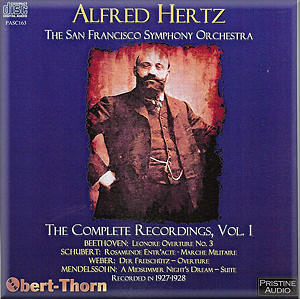 |
 |
|

AVAILABILITY
Pristine Audio
(as CD or FLAC or mp3 download)
|
Alfred Herz - The Complete San Francisco
Recordings Volume 1
Ludwig van BEETHOVEN (1770-1827)
Leonore Overture No. 3, Op. 72a. (1805) [13:11]
Franz SCHUBERT (1797-1828)
Rosamunde D.797 - Entr’acte No.3 in B flat (1823) [4:43]
Marche Militaire D.733 No.1 [4:45]
Carl Maria von WEBER
(1786-1826)
Der Freischütz - overture (1817) [9:19]
Felix MENDELSSOHN
(1809-1847)
A Midsummer Night’s Dream - Overture,
Op.21 (1829) [11:54] and Incidental Music, Op.61 (1843); Scherzo [4:40],
Nocturne [6:02] and Wedding March [4:25]
 San Francisco Symphony
Orchestra/Alfred Herz San Francisco Symphony
Orchestra/Alfred Herz
rec. 1927-28, San Francisco
 PRISTINE AUDIO
PASC163 [58:59] PRISTINE AUDIO
PASC163 [58:59] |
|
|
From the nooks and crannies of early electric recording come
these San Francisco discs, ones presided over by the irascible,
controversial
- and on this evidence highly accomplished - Alfred Herz (1872-1942).
The conductor was born in Frankfurt am Main, conducted Wagner
at the Met, in the process (1903) breaking the Bayreuth-imposed
ban on staged Parsifal performances. Collectors will know of
his
Berlin recordings, but far fewer will have come across his American
Victors, which were made between 1925 and 1928; as Mark Obert-Thorn
relates they’ve never been transferred to LP or CD - with
the sole exception of the Prelude to Tristan, which will also
appear in a forthcoming volume.
Herz was appointed as the conductor of the San Francisco orchestra
in 1915 and stayed for fifteen seasons after which he guest conducted
the orchestra. He died in 1942.
I get the impression that people look down their noses at West
coast recordings. Obviously its contribution was muted in comparison
with the East, but a trawl of the personnel of the orchestra at
the time leads one to the conclusion that Herz had developed a
most impressive band. The concertmaster had been Louis Persinger,
that great player and teacher, but for Herz was none other than
Mischel Piastro, who joined in 1925 and was to stay until 1931
- and was later to lead for Toscanini in New York. Digging around
further confirms that Dutchman Michel Penha led the cellos and
Romain Verney, a suave Frenchman, the violas. In other words it
was a typical American orchestra.
All this aside and even with the rather lightweight programme
I can tell you that this is a real ear-opener of a disc. Herz’s
San Francisco recordings have clearly been undervalued these many
years, probably because they have the kind of status that Percy
Pitt’s or Landon Ronald’s have in Britain - they’re
taken for granted and therefore not listened to and therefore
not admired. Big mistake.
There’s minimal surface noise throughout and the transfers
have been effected with Obert-Thornian hyper-intelligence. The
excellent frequency response is another bonus. Leonore No.3 is
trenchant, powerful, tautly architectural, sporting strong chording
and a sure sense of projection and trajectory. The SF band plays
as well as you’d hope - and then some. Portamenti were a
part of the expressive arsenal of course and some make themselves
heard in Rosamunde, though not nearly as many as fleck,
say, Hamilton Harty’s contemporaneous recordings of the
orchestral repertoire. There’s a tad more hiss in the Marche
Militaire side but nothing to worry horses or any other livestock.
The overture to Der Freischütz is baleful when need be and
its cantilever is curvaceously aided by rich slides; the horns
too are first class. An excellently managed side join ends the
litany of praise. The major portion of the running time is taken
up with the music for A Midsummer Night’s Dream. Portamento
is strong but effective, not at all gauche; the orchestra has
been well drilled; nuance is in rich supply, the performance is
sensitive and natty, and very well worth hearing. We are too easily
hoodwinked into thinking that all classical recordings were made
on the East Coast at this time; here’s evidence of high
standards on the western seaboard - and after all, why not?
Revelatory, really, in a way, and much more to come in this series.
Jonathan Woolf
|
|















